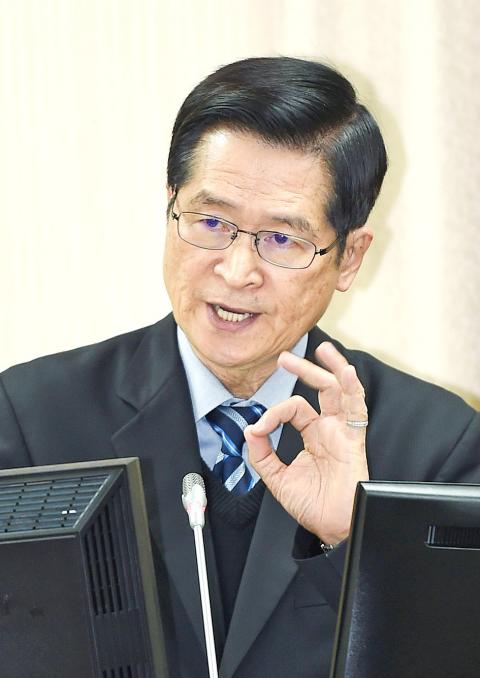The nation’s armed forces can hold the line against China’s People’s Liberation Army (PLA), Minister of National Defense Yen De-fa (嚴德發) yesterday told the Legislative Yuan’s Foreign Affairs and National Defense Committee.
During a question-and-answer session, Yen was asked to evaluate the comparative military capabilities of Taiwan and China, three days after President Tsai Ing-wen (蔡英文) told CNN that Taiwan was “capable of holding off any first waves of attacks” by China.
Democratic Progressive Party (DPP) Legislator Lo Chih-cheng (羅致政) asked what the military’s capabilities were to respond to a PLA “first strike,” and whether it had the ability to mount a pre-emptive strike against China.

Photo: Fang Pin-chao, Taipei Times
The nation’s two-staged military doctrine is to enact force protection, followed by the deployment of combat power, Yen told Lo.
“For force protection, we must be capable of absorbing the first strike, so critical and dependable forces are mechanized, and they will not stay still for the enemy to hit,” he said. “For deploying combat power, we will use counterattacks and early suppression of the enemy, as well as other actions.”
“As for pre-emptive capabilities, we possess them, but we are not at liberty to discuss them,” he said.
However, he added that those capabilities are for creating a multi-layered deterrence, not for launching first strikes.
When DPP Legislator Wu Kun-yuh (吳焜裕) asked Yen to elaborate on the national military doctrine, the minister said Taiwan was not engaged in an arms race with China and the military relies on quality to overcome quantity.
To augment force protection, the ministry is working with local governments to mobilize assets necessary to protect military installations against Chinese guided missiles, in conjunction with concealment and mobility measures, he said.
The armed forces would deploy mobile and decisive weapons systems to fight at the place and time of its choosing, with an emphasis on using the terrain to maximize asymmetric warfare capabilities in the counter-air, counter-naval and counter-amphibious operational phases of such a war, Yen said.
Chinese Nationalist Party (KMT) Legislator William Tseng (曾銘宗) asked Yen to gauge the time the military could hold out against the PLA, and what the armed forces would do if war broke out as the result of political conflict between independence and unification factions.
While the military does not quantify defensive time frames for doctrinal reasons, “we have full confidence and capability to stay on top of regional developments and defend our homeland,” Yen said.
The military’s core value is its constitutional duty to defend the Republic of China and the citizens residing within its domain, he said.
The US is certain to intervene if regional security developments threaten its national interests and Japan could possibly be involved, he said, adding that the ministry could not speak for the intentions of the Philippines.

CHAOS: Iranians took to the streets playing celebratory music after reports of Khamenei’s death on Saturday, while mourners also gathered in Tehran yesterday Iranian Supreme Leader Ayatollah Ali Khamenei was killed in a major attack on Iran launched by Israel and the US, throwing the future of the Islamic republic into doubt and raising the risk of regional instability. Iranian state television and the state-run IRNA news agency announced the 86-year-old’s death early yesterday. US President Donald Trump said it gave Iranians their “greatest chance” to “take back” their country. The announcements came after a joint US and Israeli aerial bombardment that targeted Iranian military and governmental sites. Trump said the “heavy and pinpoint bombing” would continue through the week or as long

TRUST: The KMT said it respected the US’ timing and considerations, and hoped it would continue to honor its commitments to helping Taiwan bolster its defenses and deterrence US President Donald Trump is delaying a multibillion-dollar arms sale to Taiwan to ensure his visit to Beijing is successful, a New York Times report said. The weapons sales package has stalled in the US Department of State, the report said, citing US officials it did not identify. The White House has told agencies not to push forward ahead of Trump’s meeting with Chinese President Xi Jinping (習近平), it said. The two last month held a phone call to discuss trade and geopolitical flashpoints ahead of the summit. Xi raised the Taiwan issue and urged the US to handle arms sales to

State-run CPC Corp, Taiwan (CPC, 台灣中油) yesterday said that it had confirmed on Saturday night with its liquefied natural gas (LNG) and crude oil suppliers that shipments are proceeding as scheduled and that domestic supplies remain unaffected. The CPC yesterday announced the gasoline and diesel prices will rise by NT$0.2 and NT$0.4 per liter, respectively, starting Monday, citing Middle East tensions and blizzards in the eastern United States. CPC also iterated it has been reducing the proportion of crude oil imports from the Middle East and diversifying its supply sources in the past few years in response to geopolitical risks, expanding

Pro-democracy media tycoon Jimmy Lai’s (黎智英) fraud conviction and prison sentence were yesterday overturned by a Hong Kong court, in a surprise legal decision that comes soon after Lai was jailed for 20 years on a separate national security charge. Judges Jeremy Poon (潘兆初), Anthea Pang (彭寶琴) and Derek Pang (彭偉昌) said in the judgement that they allowed the appeal from Lai, and another defendant in the case, to proceed, as a lower court judge had “erred.” “The Court of Appeal gave them leave to appeal against their conviction, allowed their appeals, quashed the convictions and set aside the sentences,” the judges